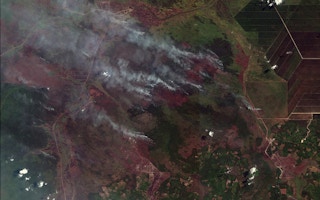Peat fires burned 293,065 hectares of land within concessions managed by Asia Pulp & Paper (APP) suppliers during last year’s haze crisis, an area amounting to 37 per cent of its holdings in South Sumatra, finds a new analysis released by a coalition of Sumatra-based environmental groups.
Of that area, 86,004 hectares was plantations, representing 26 per cent of APP’s total planted area in the province.
The findings, say the coalition, put APP’s fiber supply for its new OKI Mill in question since the Indonesian government has indicated that it will prevent replanting of areas burned in 2015.
“Our analysis raises serious questions about how this significant plantation loss will influence the fiber supply for APP’s new mega-scale pulp mill, PT. OKI Mill,” said the statement released Thursday.
The coalition — which includes Hutan Kita Institute, WALHI South Sumatra, Pilar Nusantara, LBH Palembang, Jaringan Masyarakat Gambut, FKMPH, LSM BAKAU, and the Rimba Institute — expressed concern over where the timber for the new mill might be sourced and whether an expanded footprint could have impacts on forests and communities.
It issued a series of demands, ranging from disclosure of the results of a “verification” of burned areas, rehabilitation of burned areas, and a detailed explanation of how APP will meet OKI Mill’s projected demand for fiber. The coalition also called on the Indonesian government to “conduct environmental audits, review licenses, and follow up any legal violations with appropriate law enforcement” for APP’s suppliers.
For its part, APP has repeatedly stated that its zero deforestation policy applies to all current and future suppliers, meaning that if it couldn’t develop sufficient plantations in South Sumatra to meet its needs, it wouldn’t clear forests in other parts of Sumatra or even Borneo or New Guinea to produce more fiber.
APP on Thursday also announced new initiatives to prevent and control fires in its concessions, protect and restore peatlands at a landscape level, and better manage water levels in plantations.
Still some environmental groups want more from APP.
“The legacy of twenty years of rogue operations is taking more time to address than APP wants paper buyers, investors, governments and industry watchers to know about,” said Lafcadio Cortesi, Rainforest Action Network’s Asia Director, in a statement.
“The company’s track record, and our experience over the past year, suggest that APP’s efforts will require a medium to long term time horizon to address the structural and practical changes required to achieve improved outcomes on the ground.”
In an interview with Mongabay, APP’s Managing Director of Sustainability and Stakeholder Engagement Aida Greenbury acknowledged is facing challenges, but said it is working with a variety of stakeholders to address them.
“It is obvious that Business As Usual doesn’t work anymore,” Aida Greenbury, Managing Director of Sustainability and Stakeholder Engagement at APP, told Mongabay. “The growing incidences of forest fires, biodiversity loss and land conflict are evidence of this. What we need is a new business model for landscape management in Indonesia and APP wants to play a role in creating that model.”
APP is Indonesia’s largest pulp and paper producer, controlling hundreds of thousands of hectares of land from Sumatra to Kalimantan. Long a target of environmentalists for its forestry practices and conflicts with local communities, APP in 2013 adopted a comprehensive forest conservation policy that aims to reform how it operates across its supply chain. APRIL, APP’s biggest competitor, adopted a similar policy last year.
This story was published with permission from Mongabay.










